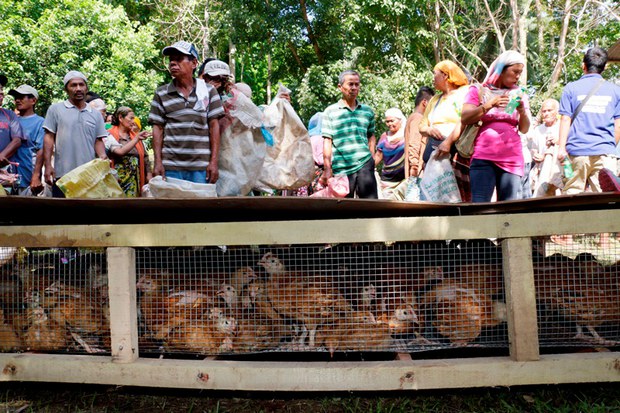Philippines to Cull 400,000 Birds to Contain Flu Outbreak
2017.08.11
Manila
 Filipino farmer beneficiaries wait for chickens to be distributed at a community nursery in Midsayap, a municipality of Cotabato province, Philippines, March 21, 2017.
Filipino farmer beneficiaries wait for chickens to be distributed at a community nursery in Midsayap, a municipality of Cotabato province, Philippines, March 21, 2017.
The Philippine government on Friday announced an outbreak of bird flu, with the agriculture department saying that an estimated 400,000 birds would be culled to prevent the spread of the influenza that so far is not known to have crossed species.
Experts at the Bureau of Animal Industry and the University of the Philippines have confirmed the presence of a strain of the virus at a farm in the town of San Luis in northern Pampanga province, Agriculture Secretary Emmanuel Piñol said.
Its owner had earlier reported that some animals, including chickens and ducks, had died suddenly and that farm workers could not immediately figure out the cause.
However, there were no known cases yet of human transmissions, Piñol said.
“We will cull all 400,000 birds within the one-kilometer area. We don’t want the disease to spread,” Piñol told reporters.
The mass slaughter of the birds was expected to be carried out Friday, and all farms located within a one-kilometer radius (0.62 miles) from where the initial infections were first reported were to be affected, officials said.
The virus was said to have begun spreading in May. Farm owners initially had tried to keep the incidents under wraps from animal quarantine and agriculture officials but, by July, nearly 40,000 birds had been infected.
At least six farms located near the town of San Luis were known to have been infected, the department said.
However, the number of birds expected to be culled could go beyond 400,000 and may reach a million, Piñol said.
“We really have to do it because we don’t want the disease to spread. I already ordered our quarantine department to set up (quarantine) stations in the area,” he added.
He said he had already notified President Rodrigo Duterte as well as Health Secretary Paul Jean Ubial about the outbreak.
To help contain the spread of the disease, the agriculture department has also ordered a freeze on the shipment of live birds from the affected areas to other parts of the country.
While the avian flu virus has not yet been classified as deadly, Piñol said his department was not taking any chances.
In January, China reported some 79 deaths from the more virulent H7N9 bird flu virus, its highest number in years. This brings the total of those killed since October to 100.







